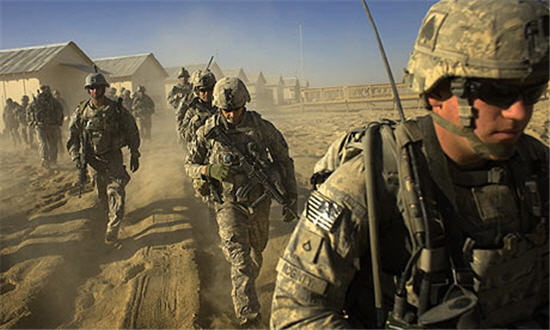Was Afghanistan Worth It?
My latest for The National Interest, "Was Afghanistan Worth It?" takes issue with the Marine commandant's assessment of that question.
My latest for The National Interest, “Was Afghanistan Worth It?” takes issue with the Marine commandant’s assessment of that question.
As his Marines prepare to leave Helmand Province, General James Amos, the commandant, says the mission has “paid off.” He cites several metrics:
“The number of violent events, from gunshots to roadside bombs, has dropped in almost every district since 2010.”
“Roads have been paved and markets secured, allowing commerce to grow in places like Marja, Nad Ali and Lashkar Gah, the provincial capital.”
“Civilian casualties are down by 20 percent.”
[…]
Was it worth the 360 dead and 4700 wounded Marines it cost to get to that point? That’s a metaphysical question, not one of public policy. Certainly, though the answer will be a resounding no if the gains “turn overnight” once NATO forces leave the country, as Amos acknowledges is possible.
More importantly, though, it makes little sense to measure success based on the situation on the ground in 2010. The war started, after all, in October 2001 in response to the September 11 terrorist attacks, and success should be measured against the objectives set forth at the outset.
Indeed, all the metrics cited by Amos are much worse now than they were when the war began. The U.S. invasion set off the gunshots, roadside bombs, and civilian casualties. Eleven years ago, few Americans much cared about the conditions of the roads or the state of commerce in Marja and Lashkar Gah, places they never knew existed. And the expansion of an army that Afghanistan can’t independently afford would be universally hailed as a setback absent a continuing insurgent threat.
More at the link, where I look at the war aims outlined by President Bush way back in October 2001.







Well, as I said back in ’01, “No.”
No, Nej, Non, Nee, Ara, Nien, Nem, Needa, Tidak, Jab, Net,……. that out to about cover it.
General Amos is addressing only his current mission in Helmand, which may well have met whatever Management by Objectives goals he had. Looking at the war broadly, as you note, James, the realistic objectives were met in the first several weeks. Everything since then has clearly been a waste. We allowed a fairly limited goal of crippling Al Quaeda to morph into an ill defined war against the Taliban. As someone pointed out years ago, Taliban isn’t an organization, it’s a life style. It’s like invading Georgia to defeat the rednecks.
Our MBA president seems to have been a lot better at starting wars than at managing them.
Now all we can do is get out, which Obama is doing. I wish he had done so sooner, but I don’t expect him to commit political suicide to get out. The country is now ready to get out. Four years ago we weren’t.
Afghanistan is a tough nut to crack. Ask the British. Ask the Soviets. Hell, ask anyone who’s tried to crack it.
On the flip side of that coin, however, no domestic 9/11’s since 9/11 speaks for itself, doesn’t it?
Retrospectively looking at stated war aims from over a decade ago is a nice way to push one’s agenda, but it’s misleading, unfair and borderline if not completely dissonant, cognitively. Scenarios change. Facts on the ground change. Other events happen. Priorities change. Politics happens. Economics. Etc.
You don’t go back and analyze the stated objectives of a team at the beginning of the 1st quarter. The question is who won the game, not whether original game plans proved successful or unsuccessful.
In certain respects this entire blog post is based upon a faulty question and thus a faulty major premise. The real way to phrase this inquiry is:
“Would Afghanistan have been worth it had the war been prosecuted with the extreme ruthlessness the situation demanded?”
We fought a strike, contain and nation building war in Afghanistan. We should have fought a de facto war of annihilation. And that should have included Western Pakistan.
@Tsar Nicholas:
Hey, want to buy my anti-elephant medallion for $500? Guaranteed to scare away every elephant in the area. We haven’t had one around here in decades, which proves it works!
@Tsar Nicholas:
How dare people rate success on the basis of achieving what was originally promised!
… Excuses are made. Lies are told. Heads lodge in asses. Bullshit ebs and flow like the tides…
@Tsar Nicholas:
I think you mean “no successful”
(The FBI earned their money.)
@Tsar Nicholas: Hey Conan, you don’t have much military experience do you? Carpet bomb the whole country back to the stone age? Yes, that wouldn’t inflame the entire Muslim world.
That chicken crowing every morning and causing the sun to rise also speaks for itself…so to speak….
I like the way Daniel Larison over at The American Conservative has been diving into why the Right was wrong (and the Left was right) about these wars.
Stuff that should be internalized by any improved conservative movement.
@Tsar Nicholas:
As always, a great way to win the hearts and minds of the Afghan people. Counter-insurgency warfare always devolves into kill everyone who wants us to leave, so we can leave.
@john personna:
Jeeze man, don’t say things like that when I haven’t swallowed the last slug of coffee.
Nothing since WW2 has been “worth it”.
The only 2 things going for Afghanistan is that 1). it could…arguably…be justified…and 2). compared to it’s sister war…Iraq which is the biggest foreign policy blunder in our history…it looks good.
Had Bush43 managed it properly…it would look completely different to us today.
At this point, I think it’s obvious that it’s cost more than it’s benefitted us.
That said, going back to 2001, I don’t really know how we could have avoided *some* form of military action in Afghanistan. Trouble is I also can’t really imagine realistically preventing mission creep. So you have military action that is at a minimum justifiable and at a maximum is necessary. But this also leads more or less inevitably to 10 years of some damn fool nationbuilding crusade.
I wrote a terribly naive letter to President Bush (back when I thought of him as President Bush, as opposed to Bush the Lesser) shortly after 9/11. I urged caution and literally begged him to view war as an absolute last resort. Heh, yeah.
But the hell of it is even if the guy in the big chair *had* been a cautious fellow dubious of foreign entanglements, I’m not sure we would’ve avoided Afghanistan.
God forbid we ask Afghanis if the war was worth it for them. No, apparently, we can answer the question just by asking Americans. And apparently, it’s right to measure the cost of the war in American lives only.
It would have been silly to expect otherwise from a conservative.
@Rob in CT:
Why? Why not just go in, take out Al Qeda, and then leave? If something similar pops up, we can go back. We could have invaded Afghanistan five or six times for what we’ve wasted on national building.
@Tsar Nicholas: Nor before 9/11 either.
@Stormy Dragon: Excellent question. And like Vietnam we could have bought the place for what we spent trying to blow it up.
@john personna:
hes not without his flaws, but Larison is easily one of the best bloggers around. the conservative movement needs people exactly like him.
@swbarnes2:
Every article isn’t about every thing. The question being asked and answered is whether the war in Afghanistan—and, especially, the post-2010 fighting there—has been worth the cost in blood in treasure to the United States. The metrics for that, I would submit, are American.
@James Joyner:
Why oh why would other countries think that Americans don’t give a rip about their welfare? It can’t be because large numbers of Americans are in the habit of ignoring the needs and desires and losses of other people, right?
I’ve been to Iraq and Afghanistan several times. Retiring at the end of the year, so I won’t be returning. Unfortunately I’ve also known a few who didn’t come back. Sadly, as much as I’d like to be able to repeat the mantra that “they died defending our freedom”, I can’t say it with a straight face.
Well over a decade later, I’ve still yet to hear a convincing description of what “winning” in Afghanistan (or Iraq) even looks like.
You would think that would be a question we’d want to have a pretty definitive answer to before the first boots ever hit the ground.
But hey, who wants to bother with silly stuff like that? Let’s just go invade Iran, maybe we’ll get it right on the 3rd try.
This is a two part question: Was it worth it to us? Two,was it worth it to the Afghanis? From a US perspective, I would say, on balance, no, though I don’t have a lot to base an opinion on.
To the Afghanis, here is one perspective
http://www.foreignpolicy.com/articles/2013/03/04/what_went_right
I do know there will be lot of post-mortems with the ideologues jockeying for position to write the history.
Poppy Bush shit-canned the mission creep back in the first Iraq war. It’s really not very hard. Set a goal, publicize it, accomplish it, remove yourself.
As to James’ question whether Afghanistan (and Iraq) was worth it?
Is the world safer? Is America safer? Have we traded security for freedom? What is the cost of being the world’s hegemonic power? How often will minor players score a big “win?” How do we deal with 3000 dead and 6000 injured on our soil? What are the consequences of our past history in meddling with the Middle East? What are the consequences of our allies actions? How do we cope with an easy victory over conventional forces and yet know that asymmetrical warfare will surely follow where our advantage will be greatly reduced?
What is the the blood price of an American? An American soldier? An American civilian just going to his or her job?
As to James’ question whether Afghanistan (and Iraq) was worth it?
God fucking NO!
@Scott:
We have to share a planet with these people; with everyone, so those can’t be completely separate questions.
Or, to put it another way, if James wishes to count American deaths down to the person, and ignore Afghani deaths, which are likely 10x higher, he should have at least mentioned that a very large cost of our Middle East policy in general is that a hell of a lot of people know from our policies that we are fine with passing policies that hurt them (like propping up supportive dictators, ignoring the looting of museums, etc). People in the future are going to act on this conclusion in ways that we probably won’t like.
James et alia,
Can you please release my comment from moderation? I dropped the f bomb at the very end. But it seemed appropriate at the time.
First off, I admit I could be wrong here. Watching Iraq II and Afghanistan unfold may have jaded me excessively. That said…
Basically, it’s the “you broke it you bought it” situation. Once we invade a country, we become at least somewhat responsible for what happens there (one can resist this, of course. That doesn’t mean you’ll succeed). This leads to “nationbuilding” efforts.
I actually agree with you and de stijl that it shouldn’t be that way. I’ve said for years now that, in hindsight, the mission in Afghanistan should’ve been 1 part man-hunt, 1-part punitive expedition, and should’ve been over in months.
My point is that appears to be much easier said than done.
@Rob in CT:
I agree with the thrust of your post, but what I miss is the necessity for trying to fix a broken state while hunting and punishing, or after the fact. Nation-building in primitive areas, especially attempting to build to our standards for pure water, sanitation, roads, power, and a military the host nation cannot afford is futile, and a huge waste of our resources and finances.
It is a safe bet that these nations will revert to their old ways inside of a year or two, the grand infrastructure will get sand in the gears, and the roads will be filled with potholes. In five years, it will be as if we were never there. As for denying the Islamofascists training grounds, do we really believe we can shoo them away from the entire Islamic world?
@Tsar Nicholas:
Can’t see how fighting a “war of annihilation” in a state with a shaky government and nuclear weapons could have backfired.
I don’t know if it was worth it, though I’m inclined to agree with those who say no. But I do know that there was no avoiding it. 9/11 happened and a US invasion of Afghanistan was going to happen. The only question was, would it be done the right way (with adequate resources and commitments following the initial combat) or the wrong way. We know how it turned out.